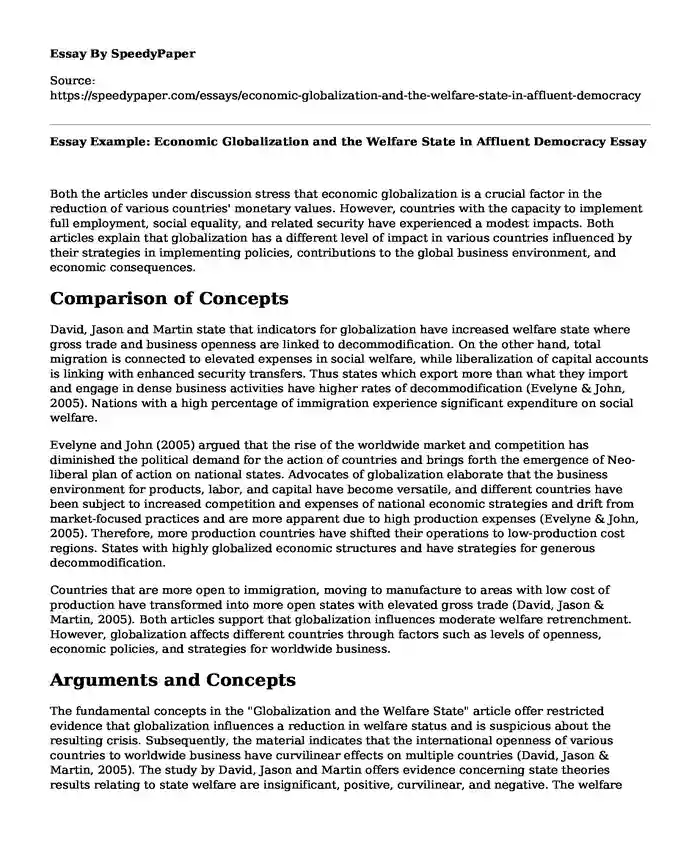
| Type of paper: | Essay |
| Categories: | Globalization Policy Democracy |
| Pages: | 3 |
| Wordcount: | 634 words |
Both the articles under discussion stress that economic globalization is a crucial factor in the reduction of various countries' monetary values. However, countries with the capacity to implement full employment, social equality, and related security have experienced a modest impacts. Both articles explain that globalization has a different level of impact in various countries influenced by their strategies in implementing policies, contributions to the global business environment, and economic consequences.
Comparison of Concepts
David, Jason and Martin state that indicators for globalization have increased welfare state where gross trade and business openness are linked to decommodification. On the other hand, total migration is connected to elevated expenses in social welfare, while liberalization of capital accounts is linking with enhanced security transfers. Thus states which export more than what they import and engage in dense business activities have higher rates of decommodification (Evelyne & John, 2005). Nations with a high percentage of immigration experience significant expenditure on social welfare.
Evelyne and John (2005) argued that the rise of the worldwide market and competition has diminished the political demand for the action of countries and brings forth the emergence of Neo-liberal plan of action on national states. Advocates of globalization elaborate that the business environment for products, labor, and capital have become versatile, and different countries have been subject to increased competition and expenses of national economic strategies and drift from market-focused practices and are more apparent due to high production expenses (Evelyne & John, 2005). Therefore, more production countries have shifted their operations to low-production cost regions. States with highly globalized economic structures and have strategies for generous decommodification.
Countries that are more open to immigration, moving to manufacture to areas with low cost of production have transformed into more open states with elevated gross trade (David, Jason & Martin, 2005). Both articles support that globalization influences moderate welfare retrenchment. However, globalization affects different countries through factors such as levels of openness, economic policies, and strategies for worldwide business.
Arguments and Concepts
The fundamental concepts in the "Globalization and the Welfare State" article offer restricted evidence that globalization influences a reduction in welfare status and is suspicious about the resulting crisis. Subsequently, the material indicates that the international openness of various countries to worldwide business have curvilinear effects on multiple countries (David, Jason & Martin, 2005). The study by David, Jason and Martin offers evidence concerning state theories results relating to state welfare are insignificant, positive, curvilinear, and negative. The welfare state is not having a massive effect on globalization; however, the results vary according to various countries, business associations, and other related factors (Evelyne & John, 2005). Latin America nations, Scandinavian countries, and the Caribbean have similar trends with regards to the effects of globalization.
Evelyne and John's article key points elaborate both economically and socially, liberalization and denationalization majorly exist in the Caribbean and Latin American than highly industrialized nations. They state that globalization is influenced by the relentless function of impersonal business market factors influenced by transportation technological advancements and communication strategies. Decisions made by various nations, political status, strong economic interests, and global organizations fuel the situation of globalization in different national states. Governments influence the condition of globalization in their countries and contribute to the worldwide economy (David, Jason & Martin, 2005).
Conclusion
Both the articles use quantitative and qualitative analysis with numeric data evidence to support their convincing arguments. The digital data collected from various cases are used to develop arguments and act s evidence. The solutions provided are not uniform because not all the nations used for the discussion have similar essential opportunities, policies, capacity, and structures.
References
Evelyne Huber & John D. Stephens. (2005). State Economic and Social Policy in Global Capitalism.Cambridge University Press.
David Brady, Jason Beckfield & Martin Seeleib-Kaiser.(2005). Economic Globalization and the Welfare State in Affluent Democracies, 1975-2001. American Sociological Review.
Cite this page
Essay Example: Economic Globalization and the Welfare State in Affluent Democracy. (2023, Mar 02). Retrieved from https://speedypaper.com/essays/economic-globalization-and-the-welfare-state-in-affluent-democracy
Request Removal
If you are the original author of this essay and no longer wish to have it published on the SpeedyPaper website, please click below to request its removal:
- Free Essay: Case Study on Value of Health IT Investment
- Eating Disorder Essay Sample: The Thin Film Analysis
- Free Essay: Health Prevention in the United States
- Free essay on the program for gifted students in the Kingdom of Saudi Arabia
- Paper Example of Annotated Bibliography on Minimum Wage Debate
- Free Essay: Description of Two Theories That Have the Greatest Influence on Social Networks
- Essay Sample on Nursing Empathy and Values
Popular categories




